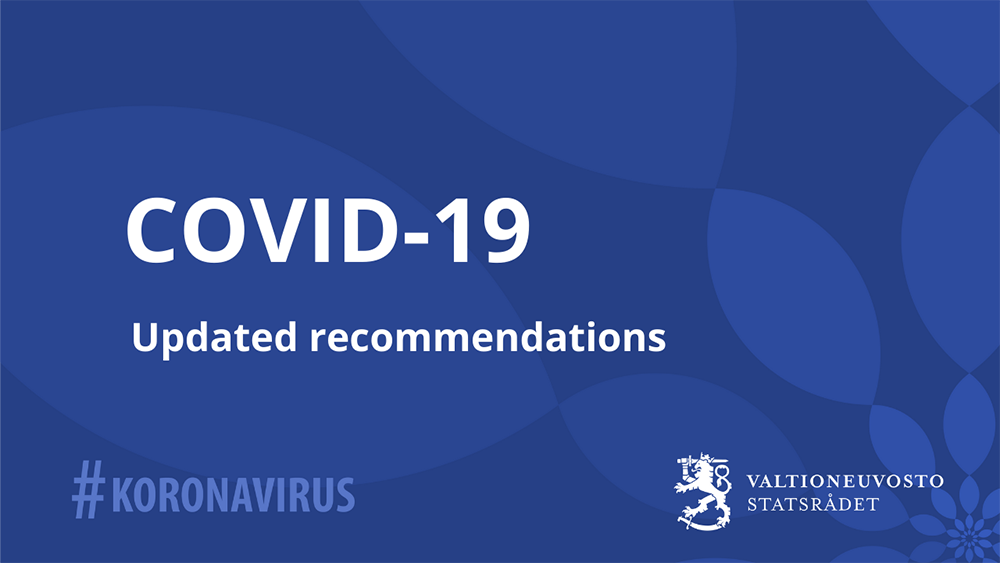Updated recommendations for early childhood education and care, school education and vocational education and training to prevent the coronavirus epidemic

The Ministry of Education and Culture and the Finnish Institute for Health and Welfare have updated two recommendations related to the prevention of the COVID-19 epidemic. One of the recommendations applies to providers of early childhood education and care and school education, and the second to providers of general upper secondary education and vocational education and training, liberal adult education, basic education for adults, universities of applied sciences and universities.
The recommendations were updated because the epidemiological situation has deteriorated and because the temporary provisions of the Communicable Diseases Act have been extended. The Finnish Parliament is currently considering the extension of the temporary provisions of the Communicable Diseases Act until 30 June 2022. The new recommendations replace the corresponding recommendations issued in October.
Tighter recommendations for early childhood education and care and primary and lower secondary education
The stricter recommendations were already in effect in early childhood education and care and in comprehensive schools earlier during the COVID-19 epidemic.
The Ministry of Education and Culture and the Finnish Institute for Health and Welfare recommend that early childhood education and care be organised so that child groups are not mixed or combined. Staff members should also work with one and the same group of children.
In primary schools, different teaching groups should also be kept separate throughout the school day. In optional subjects, the teaching groups may change if the teaching cannot be organised in any other way. If it is not possible to keep teaching groups separate in secondary schools, for example, it is recommended that teaching be staggered and organised in a spacious way and hygiene be stepped up.
Big joint events should not be organised if it cannot be done in a spacious way and sufficient hygiene cannot be ensured. If celebrations held in early education centres or schools are ones where the participants include people other than staff, children or students, such events are considered to be public events where local and regional regulations must be followed. In principle, the general restrictions on gatherings do not apply to teaching in early education centres and schools and other statutory activities of educational institutions.
People other than children and staff members should avoid spending time in the vicinity of the school or early education centre, and the staff should avoid assembling together. The Ministry of Education and Culture and the Finnish Institute for Health and Welfare also recommend that staff should not move from one site to another.
Updates to the recommendations for upper secondary education, higher education, liberal adult education and basic education for adults
The recommendations for upper secondary education, higher education, liberal adult education and basic education for adults have been updated to comply with the extended temporary provisions of the Communicable Diseases Act.
The updated recommendations recommend the use of remote connections if teaching is organised for a large number of students.
Other measures that were in place already in the previous recommendations include the staggered use of restaurants and canteens and the recommendation to observe sufficiently spacious distancing as required by the Communicable Diseases Act. Students may live in shared rooms in dormitories, but educational institutions must keep a record of the inhabitants so that it is possible to trace infections.
Recommendations on the use of masks may vary regionally
Regional and local authorities may, taking into account the epidemiological situation, issue their own recommendations supplementing the national recommendations on the use of masks. For example, regional and local authorities may recommend that even younger children should use masks.
Education providers in upper secondary education, higher education, liberal adult education and basic education for adults may also issue their own recommendations on the use of masks in teaching and exam facilities. For this reason, more specific recommendations on the use of masks may vary in different educational institutions.
The purpose of the recommendations is to support the provision of early childhood education and care, school education and vocational education and training safely and to give guidance on the safe use of spaces during the COVID-19 epidemic. By complying with the recommendations, infections can be prevented and the number of people exposed to the virus can be reduced.
Recommendations:
- Recommendations by the Finnish Institute for Health and Welfare and the Ministry of Education and Culture to providers of education and early childhood education and care 22.12.2021
- Recommendations of the Finnish Institute for Health and Welfare and the Ministry of Education and Culture for universities, universities of applied sciences and providers of general upper secondary education, vocational education and training, liberal adult education and basic education for adults 22.12.2021
Inquiries:
- Eeva-Riitta Pirhonen, Director General, tel. +358 295 330 258 (early childhood education and care, primary and lower secondary education and liberal adult education)
- Heli Nederström, Senior Ministerial Adviser, tel. +358 295 330 122 (early childhood education and care, primary and lower secondary education and liberal adult education)
- Sami Aalto, Senior Ministerial Adviser, tel. +358 295 330 082 (general upper secondary education and vocational education and training) Laura Hansén, Senior Ministerial Adviser, tel. +358 295 330 098 (higher education institutions)